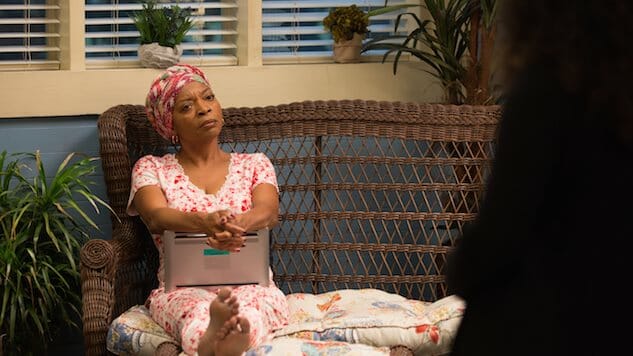Aunt Vi (Tina Lifford) has always been the anchor of the Bordelon family—the fun, beloved auntie who keeps it real and always leaves you feeling better than you did before. The writers have alluded to her worsening health with fainting spells, her hair falling out and her failing vision—all of which she’s been hiding. Quite frankly, it’s becoming worrisome.
In “Drums at Dusk,” Aunt Vi receives an unexpected surprise visit at the High Yellow from the owner of Rollins Supermarket (who loved her homemade cherry pie), with a $50,000 contract to sell her pies. Looking for advice from Charley (Dawn-Lyen Gardner), she heads to the Queen Sugar Mill office and finds herself her face-to-face with Lorna (Sharon Lawrence), scratching the surface of the tensions between them. Aunt Vi is blunt, meeting her with a sour “What are you doing here?”: Charley’s description of their division as “ammonia and bleach” is apparent. Vi is concerned that Lorna’s presence will stir up old hurt for Nova (Rutina Wesley), as Ernest left her mother for Lorna:
Aunt Vi: I won’t have you upsetting Nova.
Lorna: Nova is a grown woman.
Aunt Vi: Who just lost her daddy for the second time after you stole him the first time.
Beyond the old tension, “Drums at Dusk,” written by Valerie Chu and directed by Julie Dash (Daughters of the Dust) looks into the depths of the color divide and what it means to be black in white spaces. When Charley attends the Sugar Cane Society meeting, the reception she receives is chilly, from the lack of eye contact to being told, “You’re new here. Maybe you listen for a while.” Her mother, looking through her business plans, finds fault in Charley not expanding beyond struggling black farmers—because, as the saying goes, “Money talks.”
“Be the bigger person, Charley. Reach across the color divide because green, that’s the only color you should be looking at here.” —Lorna
On the other end, Charley confides to Aunt Vi that the Society’s treatment of her—a black woman in a white- and male-dominated industry—stung: “They treated me like I was invisible. Not just me but the secretary, and the maid, and Keke (Tanyell Waivers). I just had to sit there and take it because I don’t want to be the angry black woman at my first meeting.”
The episode also continues to delve into Darla’s (Bianca Lawson) past struggles with drug addiction. While wedding dress shopping with Charley, Darla stands like a little girl in a beautiful gown, quietly taking in Charley sharing her memory of being pregnant while shopping for a wedding dress with her “Queen of Brutal Honesty” mother. As Darla stands on the display, eyes watering, heartbroken for not having this experience with her mother, she breaks the silence: “My family doesn’t even care that I’m getting married.” The calls she sent went unanswered, leaving only the need to please her mother, the desire to feel pride in place of embarrassment. The fact that her past mistakes have shut her out from her loved ones is still an anchor around her spirit. “Even if you never hear from them again, you are still surrounded by people who love you,” Charley assures her.
Darla is looking forward to her new start with Ralph Angel (Kofi Siriboe) by moving in with him and their son, Blue (Ethan Hutchinson). Discovering the crumbled flier for a marriage counseling session from Aunt Vi, she’s on board with addressing the issues in their relationship. Ralph Angel, on the other hand, is against anyone telling him how to be a husband. Her past comes to haunt her again as she’s recognized by a man at the gas station who called her “Star” asking for sex—all within earshot of Ralph Angel.
In usual Ralph Angel fashion—with his passive aggressive energy, he rarely lets things go—this leads to an argument over the encounter earlier that day. He questions her initial denial: her sex work persona, “Star,” was a driving force in her losing Blue to Aunt Vi. The two point fingers at their respective shortcomings; she brings up his stealing, but he says his actions were justified because their intentions were different. His were for the benefit for their son, while hers were simply for self.
Their tug of war about Darla’s addiction and sobriety—and how the former seems to always overshadow the present—presents a dilemma. He wants to hold her accountable, but she is frustrated that he seems not to see her for who she has become. And for that she makes her condition crystal clear: “If you can’t accept me for the person that I am right now, I can’t marry you.” The question now is this: Can they work through their issues, or will their marriage end before it even begins?
Ashley G. Terrell is a freelance entertainment writer based in Michigan. Her work has appeared in Ebony Magazine, The Huffington Post, Black Girl Nerds,
and more. She is currently working on her first novel and is the creator of the blog, The Carefree Black Girl Chronicles of ASHLEMONADE. You can follow her on Twitter>